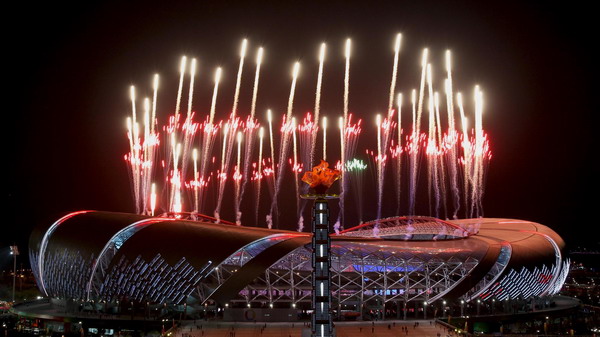7th National Intercity Games opens in Nanchang
 0 Comment(s)
0 Comment(s) Print
Print E-mail
China Daily, October 17, 2011
E-mail
China Daily, October 17, 2011
 |
|
Fireworks are seen during the opening ceremony of the 7th National Intercity Games (NIG) in Nanchang, capital of East China's Jiangxi province, on Oct. 16, 2011. [Photo/Xinhua] |
The 7th Chinese City Games, the last multi-sport games held in China before the 2012 London Olympic Games, officially opened in Nanchang, the capital city of Jiangxi province on Sunday.
It's the biggest national sport gala ever held in Nanchang, a famous historical and cultural city boasting of numerous historic revolutionary sites.
The 10-day Games will see more than 6,000 athletes from 57 delegations across the nation competing in 301 events of 25 sports. The parade also included athletes from Hong Kong and Macao, the two special administrative regions of China.
The City Games, seen as a seedbed for future Olympic champions, features most of the sports on the Olympic Games program, including soccer, basketball, table tennis, tennis, archery, track and field, swimming, diving, judo, kayak, shooting, weightlifting and wrestling.
The medal standings, however, will not be announced during the City Games in order to make sure delegations focus on grooming prospects rather than impressing on such standings.
Young athletes have been encouraged to take part in the competitions to gain experiences for international competitions and even boost their chances of being selected for the future Olympic Games.
In some of the sports, the youngsters will face an uphill task of competing against established athletes like Ye Shiwen, a 15-year-old swimmer who snatched the women's 200m individual medley title in the world championships held in Shanghai last July.
Many outstanding Olympic champions like Athens Games men's 110m hurdles champion Liu Xiang, women's table tennis player Deng Yaping, arguably the all-time great, and diving queen Fu Mingxia, winner of four Olympic gold medals, all used this quadrennial event as a platform en route to their world fame.
Before the Games was officially open on Sunday, finals of more than 40 events from eight sports, including softball, hockey, gymnastics and diving, have already concluded.
To ensure the Games a success, China has vowed tough anti-doping controls with more than 300 anti-doping staff. "We will adopt zero tolerance approach against doping and let them know fair play is much more important than getting good results," said Liu Peng, director of State General Administration of Sports.
A total of 1,190 tests will be conducted during the Games, 10 percent up over the last edition, and the blood test will also be included. Besides, a campaign of promoting anti-doping knowledge among youngsters has been launched in the athletes' village.
Apart from Nanchang, eight other cities of Jiangxi will play host to the Games' tournaments. Thirty-two stadiums and other facilities have been built or refurbished for the Games and 17 of them are located in the capital city.
The City Games was inaugurated in 1988.





